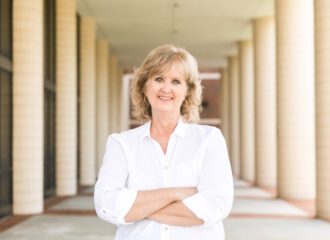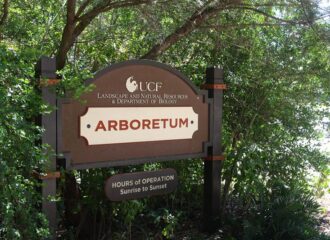by Seva Reilly
This article discusses suicide, self-harm, and mental health related topics.
Please note that if you are in crisis, help is available. You can call, text, or chat 988 for confidential services. The 988 lifeline is available 24/7 by text or call; or by chat at 988lifeline.org. You may also call the Counseling and Psychological Services (CAPS) center on UCF campus at (407) 823-2811. CAPS offers individual, group, and couples counseling, as well as online workshops. For a full list of CAPS resources, please click here.
It started in the Fall 2022 semester. I was in my senior year of undergrad, completing a degree in Communication Sciences and Disorders (CSD) at UCF. I also was taking a leadership studies class with a service component. Though I was actively volunteering with UCF Aphasia House, I was seeking a new experience. I had seen someone else talk about volunteering with the Crisis Text Line (CTL) during the pandemic and thought this would be a great opportunity to directly help people in need and build my own communication skills. As a volunteer, I would be able to practice holding challenging conversations with empathy and concern while also upholding boundaries. Starting in August 2022, I completed CTL’s 30-hour training in active listening, good contact techniques, and cultural competency.
CTL is one of the centers that responds to 988 messages. Formerly the National Suicide Prevention Lifeline, 988 offers free, confidential support to anyone in crisis. It is available 24/7 through call, text, and chat. As someone who has always found it easier to communicate through the written rather than spoken word, I thought this was an incredible outlet to use my passion for writing to benefit the community. On CTL, the highest volume of texters message between 10pm and 6am. I spent many hours up late at night or in the early morning working toward the 200-hour lifetime volunteer requirement.
What started out as a volunteer experience for a service-focused class turned into over two years of actively volunteering and responding to texters in crisis. During this time, I finished my undergrad degree and chose to pursue a Master’s in Social Work (MSW) at UCF. My experiences as a volunteer crisis counselor impacted me in innumerable ways, both personally and professionally.
I saw the impact of active listening first-hand. When you volunteer with CTL, texters have the option to provide anonymous feedback about their conversations with you. Initially, I was surprised to hear how deeply they were impacted just by being heard. I couldn’t believe how much our conversations meant to texters, as I received feedback like “No one has ever understood that about me before,” “Thank you for listening,” “I feel like you were my older sister when she couldn’t be there for me,” or “Thanks, I feel better and less likely to cut now.” Feedback like this speaks to the power of active listening — reflecting to others that you’re understanding what they’re saying. Active listening and understanding are the bedrock of connection, and fundamentals of humanity. I knew this conceptually, but I really saw it first-hand through the feedback of others.
I learned that empathy goes deeper than a Hallmark card. In my work with CTL, I had so many opportunities to express empathy. Volunteers practice compassion and respect for people’s autonomy throughout the entire conversation — from the risk assessment and asking about suicidal ideation and plans or non-suicidal self-injury, to the close of the conversation when you have collaborated with a texter to find solution(s) and coping strategies for the challenge. Time in this role taught me that a huge part of empathy is being able to regulate your own emotions so that you can be fully focused on the other person’s experience. Sometimes texters will bring up topics that you have strong personal opinions on or feelings about, but you can’t let your own perspectives and bias prevent you from focusing on what would help them and what they need.
I learned the importance of professional self-care. I have become more inflexible with my self-care time, blocking off time away from work or volunteering when I can do something for my own enjoyment, like dancing or playing piano. I have found I can show up for other people and be present with them, regulate my own feelings, and stay more aware of my biases when I have taken care of myself first.
My relationships in both my work and personal lives have changed. Using the tools of active listening, empathetic responding, and validation have helped me build more meaningful connections in both my work and personal lives. Also, exploring conversations with curiosity has given me opportunities to learn about and understand others’ experiences.
My career goals have evolved during my time volunteering. My experiences at CTL pointed me toward pursuing a degree and career in social work, with its emphasis on community organizing. Additionally, my volunteer role led to a full-time job offer with another 988 crisis center called DeafLEAD. I am a Crisis Counselor for the nationwide text line and have been able to complete additional training on suicide prevention and intervention. I intend to work in a variety of settings as a social worker, and I am grateful to have early career experiences in crisis response.
This experience has inspired further volunteer projects. My experiences on CTL and seeing loneliness and depression impacting the community (especially impacting youth) motivated myself and another UCF student to found a club called HOPE @ UCF (Hope through Outreach, Prevention, and Education). My club co-founder is an emergency medical technician who also recognizes the dire need for crisis response training and building supportive communities for students during the university years, a challenging time in life. Our club promotes suicide prevention gatekeeper training, mental health advocacy, and volunteer opportunities. Overall, my experiences with CTL have guided the goals I have set for this club.
Volunteering with CTL has impacted my life tremendously, not only changing my career goals and providing unique experiences, but also offering a platform to hone my active listening and empathy. A few texters over the years have said that they felt like our conversation changed their lives, and I can say the same: the conversations I’ve had through Crisis Text Line have forever changed who I am as a social worker, as a student, as an advocate, and as a human being.




